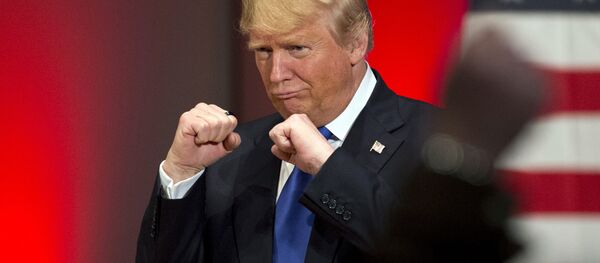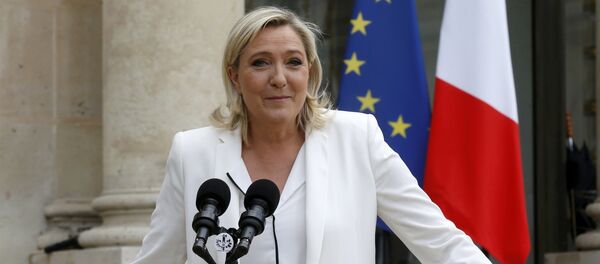Le Pen also drew parallels between the US election and the Brexit vote in Great Britain, praising them as part of the rise of "patriotic movements" in the West.
Asked about immigration, Le Pen answered: "We are not going to welcome any more people, stop, we are full up!"
"We all know that if elected, and she will be, Le Pen will have talks with the European Union in a manner to restore France’s national sovereignty, in terms of economy, laws, budget and, of course, territory. France should make independent decision on its migration policy," Gaetan Dussausaye, director of the National Front of the Youth, the youth wing of the Le Pen-led National Front political movement, told Sputnik France.
If the French people decide to decrease the number of migrants coming to the country, Brussels would not be able to block this decision, according to him.
"Le Pen is not alone. From the Balkans to the Netherlands, politicians on the far right have greeted the election of Trump with unrestrained delight and as a radical reconfiguring of the political landscape – not just in the United States, but in Europe as well. They are seeing it as a sign that their time has finally arrived, and that the politics of heightened nationalism, immigrant-bashing and anti-globalization have overturned the pro-globalization, pro-immigration consensus," an article in The New York Times read.
"It will be a significant boost for Marine Le Pen," Gyorgy Schopflin, who is also a member of Hungarian ruling party Fidesz, said.
Schopflin added that Trump’s victory, presented "a very serious blow to liberal reach."
"It turns out that more and more people disagree with it… It is an indication that it is time for the left-liberal hegemony to rethink its epistemology," Schopflin suggested.
For the French political establishment, Trump’s victory was shocking. It has spurred the electoral campaign in the country, where there is the lack of charismatic leaders, and the popularity of incumbent leader Francois Hollande is extremely low.
The migrant crisis, the crisis of European integration as well as a multitude of domestic problems have seriously damaged the reputation of mainstream political forces in many European countries, like France and Germany, where nationalist and populist movement have recently been on the rise.
"The results of the Brexit referendum were unexpected but this is what happened. Trump’s victory over Hillary Clinton was also unexpected. So, for example, if Le Pen won this would be part of that trend of shocking results," Fedor Lukyanov, head of the presidium of the Russian Council for Foreign and Defense Policy, told RIA Novosti.
According to him, the "trend" indicates that political forces are drifting away from the so-called "centrist mainstream." In this context, the electorate prefers to support non-mainstream, but more politically articulated, left or right movements and parties.
"Now, the centers of political influence are moving to the right or left. The lefts get truly left, and the rights get truly right. This is some kind of de-globalization in European politics. Brexit as well as Trump’s victory have greatly contributed to the trend," the analyst pointed out.





